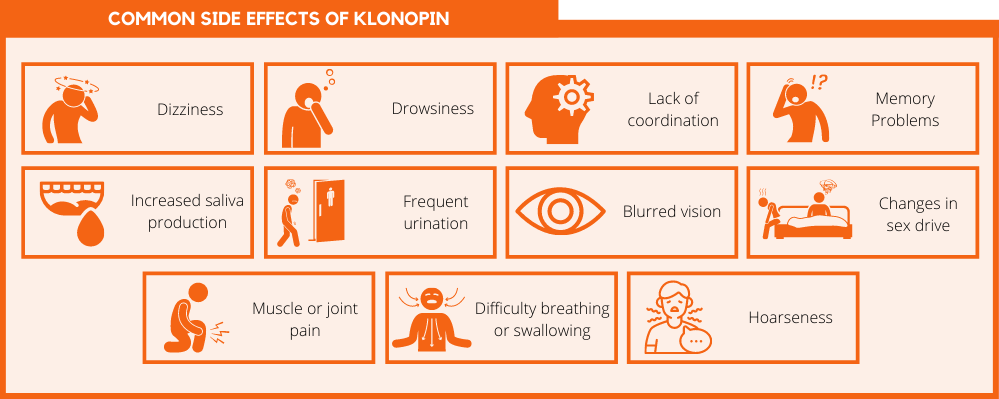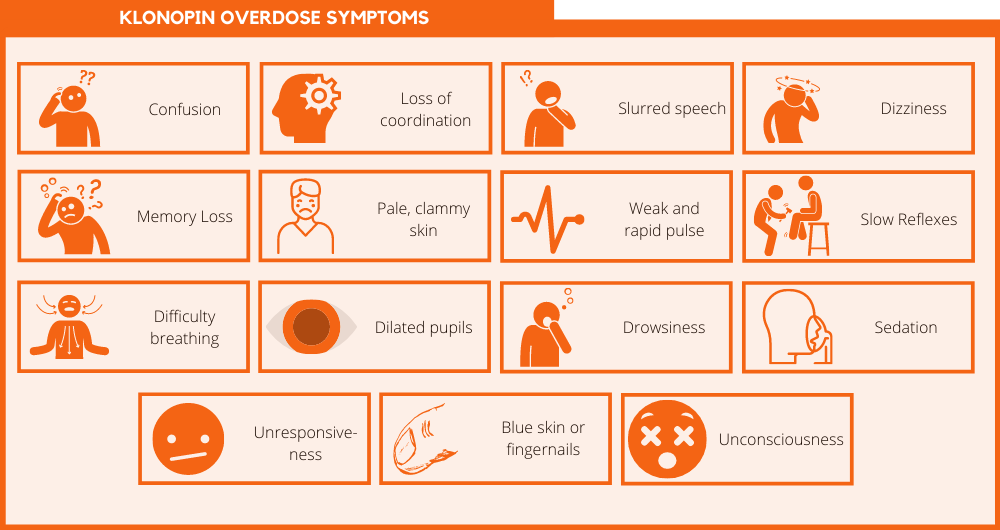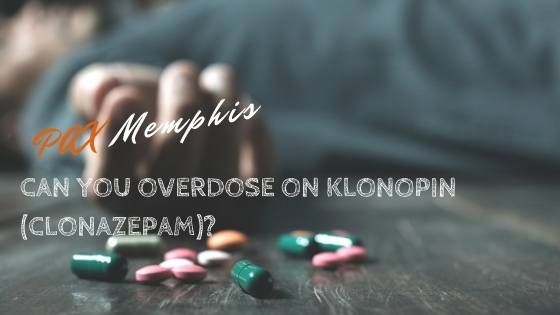Klonopin overdose is just one of many potential risks that come with abusing this drug. As a benzodiazepine and central nervous system depressant, it is easy to take too much of the drug if a person is not following their doctor’s orders.
A drug overdose occurs when a person takes too high of a dose of a substance or mixes one substance with others, raising the toxicity levels in their blood to dangerous and potentially fatal levels. Someone who has overdosed on Klonopin will exhibit signs similar to those of other benzodiazepine overdoses.
What is Klonopin (Clonazepam)?
Klonopin is a brand-name prescription medication. Both Klonopin and the generic equivalent, clonazepam, are used to treat certain types of seizures, panic disorder, and agoraphobia. It may also be used to treat alcohol withdrawal or insomnia.
Klonopin comes in three different doses: 0.5 mg, 1 mg, and 2 mg. All doses have a black-box warning on the label due to the drug’s potential for abuse, addiction, and overdose.[1]
Most benzodiazepines, including Klonopin, are not intended for long-term use. This is because long-term use or abuse of this drug can cause emotional and/or physical dependence. Once dependence develops, individuals will experience withdrawal symptoms when they stop taking Klonopin abruptly.
Klonopin is not intended to be mixed with other drugs, including opioids, other benzodiazepines, alcohol, and barbiturates as doing so can lead to an overdose. It’s important to speak with a medical provider before stopping taking Klonopin or if someone suspects drug abuse..
Klonopin Side Effects and Abuse
Klonopin may cause side effects, even when taken as directed by a doctor. However, people who abuse Klonopin by taking it in higher doses, changing the method of administration, or mixing it with other substances may be more likely to experience adverse effects.
Common side effects of Klonopin include:[2]

- Dizziness
- Drowsiness
- Lack of coordination
- Difficulty recalling memories
- Increased saliva production
- Frequent urination
- Blurred vision
- Changes in sex drive
- Muscle or joint pain
- Difficulty breathing or swallowing
- Hoarseness
Even though it is illegal, some people may abuse Klonopin illegally to produce a relaxing and sedating high.
Klonopin Overdose Symptoms and Complications
Taking too much Klonopin can suppress the central nervous system so far that it leads to an overdose. Symptoms of a Klonopin overdose include:

- Confusion
- Loss of coordination
- Slurred speech
- Dizziness
- Memory loss
- Pale, clammy skin
- Weak and rapid pulse
- Slowed reflexes
- Difficulty breathing
- Dilated pupils
- Drowsiness
- Sedation
- Unresponsiveness
- Blue skin or fingernails
- Unconsciousness
In high amounts, Klonopin toxicity can make someone stop breathing and die. A person is more likely to overdose on Klonopin if he or she has mixed the substance with other drugs. This is especially true for opioid medications.
To avoid overdose and other complications, people should avoid mixing Klonopin with other central nervous system (CNS) depressants like opioids, alcohol, and benzodiazepines. Doing so can cause a person to stop breathing, lose consciousness, go into a coma, and die.
Others will overdose on Klonopin after taking too much of the drug or changing the way it is administered. For instance, Klonopin is meant to be swallowed. However, some people crush and snort the drug and others dissolve it and inject it directly into the bloodstream.
Both snorting and shooting Klonopin make it reach the system faster, causing an overload of the drug in the body. As a result, an overdose may be more likely if a person is snorting or injecting the drug.
Treatment for Klonopin Overdose
Taking too much Klonopin can be deadly and a suspected overdose should always be treated as an emergency. Left untreated, overdose can be deadly. When medical help is sought, they can administer IV Flumazenil (romazicon) – a medication that can help reduce the effects of benzodiazepine overdose.[3]
After administering Flumazenil, the individual will be monitored and watched closely. His or her vital signs will be checked regularly and physicians may administer other medications to help treat any symptoms the person is experiencing.
Most people are likely to survive a Klonopin overdose if they get emergency medical attention in a timely manner. However, waiting just a minute too long can mean the difference between life and death.
While Flumazenil may be able to reverse a benzodiazepine overdose, it can also send the individual into immediate drug withdrawal. If this occurs, the person will require more supportive, long-term care at a detox and rehab facility.
Find Help for Klonopin Addiction Today
Klonopin, although a prescription medication, is dangerous when abused and can lead to dependence, addiction, overdose, and death. People who abuse Klonopin should seek help from a professional Klonopin addiction treatment facility near them.
To find a rehab facility or to learn more about the addiction treatment process, contact one of our dedicated treatment specialists at PAX Memphis today.
References:
Medically Reviewed: September 25, 2019

All of the information on this page has been reviewed and verified by a certified addiction professional.










